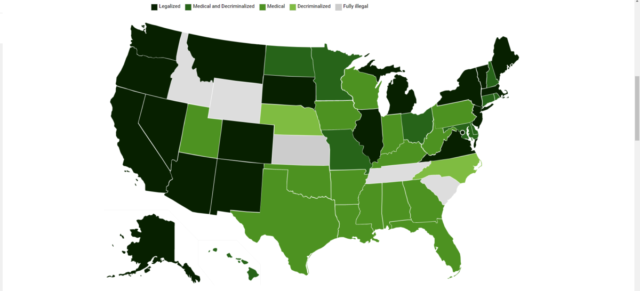

WASHINGTON — A bill aiming to end federal marijuana prohibitions is being drafted by Senate Democrats to ensure federal services and job protections.
The Cannabis Administration and Opportunity Act would not only allow state-compliant cannabis businesses to access essential federal services, but it would also protect consumers from being arrested or barred from receiving essential services for using cannabis where it is legal.
Senate Majority Leader Chuck Schumer (D-NY), Senate Finance Committee Chairman Ron Wyden (D-OR), and Sen. Cory Booker (D-NJ) released a discussion draft of the bill this week, although Democratic President Joe Biden’s press secretary said Biden still opposes cannabis legalization.
This story was reported by Gaylord News, a Washington reporting project of the Gaylord College of Journalism and Mass Communication at the University of Oklahoma.
The bill, coupled with the Safe Banking Act, which has passed the House, would serve as a catalyst for the marijuana industry, making cannabis accessible and transportable across the nation.
During a press conference, Schumer called for the expungement of state nonviolent marijuana possession charges and said provisions in the bill would also grant it on the federal level.
“For decades, young men and young women, disproportionately young Black and Hispanic men and women, have been arrested and jailed for carrying even a small amount of marijuana in their pocket — a charge that often came with exorbitant penalties and a serious criminal record because of the over-criminalization of marijuana, and it followed them for the remainder of their lives,” Schumer said. “It makes no sense, and it’s time for a change.”
Efforts by powerful Democrats come at the same time Sen. Jim Inhofe (R-OK) continues to focus on enforcing existing marijuana laws. Earlier this month, he requested $4 million in federal funding to fight illegal marijuana farms in the state.
“They are bringing with them a list of terrible — criminal activities that have absolutely nothing to do with drugs,” said Luke Holland, Inhofe’s chief of staff. “Also, human trafficking, money laundering, weapons trafficking.”
Inhofe’s request, first reported by KFOR-TV in Oklahoma City, comes after recent discoveries by the Oklahoma Bureau of Narcotics and Dangerous Drugs. On June 14, OBNDD shut down a large illegal marijuana growing operation in Muskogee County.
Mark Woodward, a spokesman for OBNDD, said the 40-acre, 24,000-plant farm had no license and that those in charge of the operation had made no effort to get licensed. In addition, the 20 to 30 Hispanic males working on the farm were potential victims of human labor trafficking.
“While none of them willingly claimed to be a victim, these men were forced to live in deplorable conditions. They stayed in make-shift shanties without electricity or running water to the property,” Woodward said. “They appeared to be bathing and washing their clothes in a less than sanitary and stagnate creek/pond nearby. Interviews revealed that they had not been paid and were told that they would receive a percentage of the profits after the harvest.”
In the past, Sen. James Lankford (R-OK) has also actively opposed pro-marijuana policies, such as 2017 legislation that permits Department of Veteran Affairs doctors to prescribe medical marijuana in states where it is legal.
A spokeswoman for U.S. Rep. Stephanie Bice (R-OKC) said Bice would have no comment until she had read the new legislation. None of the other state’s delegation returned calls seeking comment.
In April, U.S. Rep. Tom Cole (R-Moore) voted in favor of a House banking bill, the Safe Banking Act of 2021, that prohibits a federal banking regulator from penalizing a depository institution for providing banking services to a legitimate cannabis-related business. Cole had actively opposed other marijuana bills in the past.





















